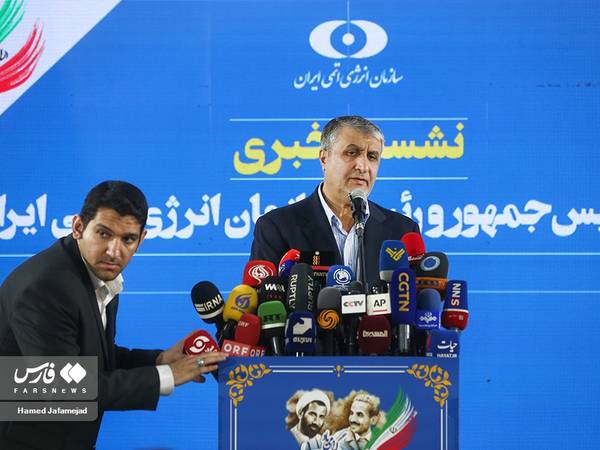Despite reports of Iran slowing buildup of uranium needed for weapons, the regime’s nuclear chief says enrichment is going on in accordance with the law.
Mohammad Eslami, the head of the Atomic Energy Organization of Iran, was referring to the bill passed by the parliament, dominated by hardliners, in December 2020, dubbed the “Strategic Action Plan to Lift Sanctions and Protect Iranian Nation's Interest.”
Eslami made the remarks during an event to unveil domestically-produced Cesium-137 radionuclide, announced as a “nuclear achievement” by the state media. The radioactive isotope of cesium is formed by the nuclear fission of uranium-235 in nuclear reactors and nuclear weapons. The product easily becomes volatile when released suddenly at high temperature, as in the case of the Chernobyl nuclear accident and with atomic explosions, and can travel very long distances in the air.
During a press conference on the sidelines of the event, Eslami was asked about reports regarding Tehran slowing down its 60% enrichment. "Our nuclear enrichment continues based on the strategic framework law," he replied, adding that “Our enemies were and are against Iran’s nuclear industry, but they all should know that the nuclear industry is a strategic industry."
The bill obligated the government to step up Iran’s nuclear program and enrich uranium beyond the limits set by the 2015 nuclear agreement, an effort aimed at forcing the United States to lift economic sanctions imposed in 2018, when former President Donald Trump withdrew from the JCPOA. The bill also mandated restrictions on monitoring by the United Nations nuclear watchdog, the International Atomic Energy Agency (IAEA), adding to the complicated dynamics of renewing the JCPOA.
The bill’s stipulation about higher levels of uranium enrichment was not an empty negotiating tactic. Iran actually began enrichment at 20 percent in early 2021, breaking the JCPOA limit of 3.65 percent. Subsequently, enrichment was increased to 60 percent during talks with West to revive the JCPOA.
Tehran now has enough fissile material for at least two nuclear bombs, and it also gradually restricted IAEA monitoring access to its nuclear facilities, introducing another complicating factor into the JCPOA talks.
Earlier in August, the Wall Street Journal reported that Iran had significantly slowed the pace at which it was accumulating near-weapons-grade enriched uranium and diluted some of its stockpile, moves that could help ease tensions with the US and revive broader talks over Iran's nuclear program.
The report came a day after Iran released four US citizens from prison into house arrest with another American already there, the first step in a planned prisoner swap that Washington expects will eventually see them return home. Iran will gain access to six billion dollars of oil revenues trapped in South Korea under US sanctions, If the US detainees are set free. The US agreed to the release of another $3 billion held in Iraq.
Elsewhere in his remarks, Eslami said that Iran has maintained interactions with the IAEA, claiming that issues regarding four Iranian nuclear sites have been reduced to two. He added that a deputy of IAEA Chief Rafael Grossi is set to visit Iran in the near future.
Iranian lawmakers are divided over cooperation with the IAEA, with some against any cooperation. After the UN nuclear watchdog signaled its unhappiness with what it said was slow progress in its dealings with Iran, lawmakers pointed out that parts of a recent agreement with the IAEA are contrary to the "strategic action."
In June, Iran said it reinstalled 10 cameras of the UN nuclear watchdog in one of its installations that were removed last year when the UN watchdog’s board of governors in June 2022 censured Tehran for its lack of cooperation with the agency. Lawmaker Ali Khezrian said that re-installing IAEA monitoring systems at Esfahan (Isfahan) nuclear site was beyond the Safeguards Agreement and based on the additional protocol to the IAEA-Iran agreement, which cover basic requirements of cooperation with the IAEA under the NPT.
The secretive unwritten deal between Washington and Tehran appears to have several dimensions not disclosed yet with reports claiming that Iran has also restrained proxy militias in Iraq and Syria in addition to limiting nuclear activities.
“The prisoner deal is a key step forward for Washington and Tehran’s efforts to lower tensions as they eye a return to formal nuclear negotiations later this year,” the New York Times quoted Henry Rome, a senior fellow at the Washington Institute for Near East Policy.
